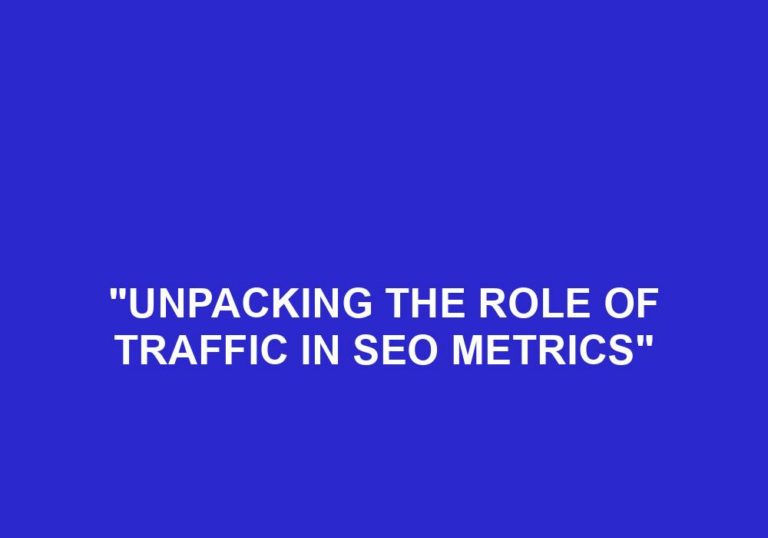Hey there! Wondering how many SEO keywords is too many? Well, let’s dive right into it!
Keywords play a crucial role in search engine optimization (SEO), helping your website rank higher on Google. But here’s the thing: stuffing your content with too many keywords can actually do more harm than good.
So, how many SEO keywords is too many? Let’s explore that together and find the sweet spot for optimizing your website. Are you ready? Let’s get started!
Wondering how many SEO keywords are too many? While there isn’t a specific number, it’s important to find the right balance. Using a diverse range of relevant keywords can help improve your search engine optimization. However, overloading your content with too many keywords can lead to a poor user experience and may even be penalized by search engines. Focus on creating high-quality content that naturally incorporates keywords and provides value to your audience.
How Many SEO Keywords is Too Many?
Keywords are a vital component of any SEO strategy, helping websites rank higher in search engine results pages (SERPs). However, there is a fine line between using enough keywords to improve visibility and overusing them, which can lead to penalties from search engines. In this article, we will explore the question, “How many SEO keywords is too many?” and provide detailed insights on striking the right balance to maximize SEO effectiveness.
The Importance of Keywords in SEO
Keywords serve as the foundation of SEO, allowing search engines to understand the content and purpose of web pages. By strategically incorporating relevant keywords into web copy, meta tags, and other SEO elements, websites can increase their visibility to users searching for specific topics or products. Keywords not only help websites rank higher in organic search results but also improve the likelihood of attracting relevant traffic, ultimately leading to higher conversion rates and business growth.
However, while keywords are essential, using them excessively or inappropriately can have negative consequences. Search engines are continuously evolving their algorithms to provide users with the most relevant and high-quality content. Overstuffing your website with keywords can be seen as spammy and result in penalties, where search engines may devalue your website’s rankings or even remove it from their index altogether.
The Ideal Keyword Density: Quality over Quantity
While there is no definitive answer to the question of how many SEO keywords are too many, the key lies in maintaining an appropriate keyword density. Keyword density refers to the percentage of times a keyword appears on a web page compared to the total word count. In the past, the focus was on achieving a specific keyword density to rank higher. However, search engines now prioritize quality content that provides value to users over keyword density.
Instead of obsessing over a specific number of keywords, it is more effective to focus on the overall quality and relevance of your content. A well-written, informative piece that naturally incorporates keywords in a way that flows naturally is more likely to attract both search engine bots and human readers. Rather than stuffing keywords into every sentence, aim to create content that addresses user intent and provides valuable insights, thereby building trust with search engines and users alike.
Strategies to Optimize Keyword Usage
While keyword density is no longer the sole focus, there are still several strategies to optimize your keyword usage and improve your website’s SEO performance. Here are a few tips to strike the right balance:
- 1. Target long-tail keywords: Instead of focusing solely on highly competitive shorter keywords, consider incorporating long-tail keywords that are more specific to your niche and have lower competition.
- 2. Use variations and synonyms: Rather than repeatedly using the same keyword, incorporate variations, synonyms, and related terms to make your content more diverse and natural-sounding.
- 3. Write for your audience, not search engines: Your primary goal should be to create valuable content that resonates with your target audience. Focus on answering their questions, providing solutions, and addressing their pain points.
- 4. Monitor keyword performance: Regularly analyze the performance of your keywords using tools like Google Analytics. This will help you identify which keywords are driving traffic, conversions, and engagement, allowing you to refine your strategy.
Remember, the goal of SEO is not just to attract search engine bots but to provide a valuable experience for your users. By prioritizing quality content and using keywords strategically, you can strike a balance that improves your website’s visibility, enhances user experience, and drives organic traffic.
Key Considerations for Effective Keyword Usage
Now that we have explored the ideal keyword density and strategies for optimizing keyword usage, let’s delve into some essential considerations for using SEO keywords effectively.
Keyword Relevance and User Intent
When selecting keywords, it is crucial to consider their relevance to your content and the intent of the users you are targeting. Put yourself in the shoes of your target audience and think about what they might search for when looking for information in your niche. By choosing keywords that align with user intent, you can ensure that your website appears in front of the right audience, increasing the likelihood of attracting relevant traffic.
Keyword Placement and Formatting
The placement and formatting of keywords within your content also play a role in optimizing their effectiveness. Here are a few best practices to consider:
- 1. Title tags and meta descriptions: Incorporate your primary keyword naturally into your title tag and meta description to improve click-through rates from search engine results pages (SERPs).
- 2. Headings and subheadings: Use keywords in your headings and subheadings to guide search engines and readers through your content. This helps search engines understand the structure of your page and enhances readability.
- 3. Body content: Sprinkle your keywords organically throughout the body of your content, paying attention to the flow and readability of the text. Avoid keyword stuffing and focus on creating quality content that engages readers.
- 4. URL structure: Include relevant keywords in your URL structure to provide search engines with additional context about your page.
Keyword Research and Analysis
Effective keyword usage starts with thorough research and analysis. Keyword research tools such as Google Keyword Planner, SEMrush, and Moz Keyword Explorer can help you identify the search volume, competition, and relevance of different keywords. By understanding these key metrics, you can make informed decisions about which keywords to target and how to optimize your content accordingly.
Furthermore, regularly monitoring and analyzing the performance of your keywords using tools like Google Analytics can provide valuable insights into user behavior, organic traffic, and conversion rates. This data can guide your keyword strategy and help you refine and improve your SEO efforts over time.
The Potential Pitfalls of Excessive Keyword Usage
While it is essential to incorporate keywords strategically, overusing or misusing keywords can have detrimental effects on your SEO performance. Here are some potential pitfalls to avoid:
Keyword Stuffing
Keyword stuffing refers to the practice of excessively and unnaturally inserting keywords throughout your content. This can lead to a poor user experience and can be viewed as spammy by search engines. Instead of trying to manipulate search engine algorithms with keyword density, focus on producing high-quality, informative content that genuinely addresses user needs.
Duplicate Content
Using the same keyword multiple times across different pages or posts on your website can result in duplicate content, which can confuse search engines and dilute the relevance of your content. Each page should have a unique focus and target a distinct set of keywords to avoid duplication.
Ignoring User Experience
While keywords are crucial for SEO, they should never be prioritized over user experience. If your content is stuffed with keywords that disrupt the flow or make it difficult for users to understand, it will have a negative impact on engagement, bounce rates, and the overall perception of your website. Always prioritize the needs and interests of your users, and ensure that your content is valuable, engaging, and easy to consume.
Conclusion
In conclusion, the question of how many SEO keywords are too many does not have a one-size-fits-all answer. It is more important to focus on quality content, strategic keyword usage, and user-centric approach. By prioritizing the needs and intent of your target audience, conducting thorough keyword research, and optimizing your content in a natural and engaging way, you can strike the right balance to maximize SEO effectiveness. Remember, successful SEO is a continuous process of refinement and improvement, so regularly monitor and analyze your keyword performance to adapt and stay ahead in the ever-evolving digital landscape.
Key Takeaways: How Many SEO Keywords is Too Many?
– It is important to focus on quality content that provides value to your readers instead of keyword stuffing.
– Aim for a keyword density of 1-2% to maintain a natural flow of your content.
– Use long-tail keywords that are specific and targeted, rather than using a large number of generic keywords.
– Regularly analyze and optimize your keyword strategy based on search trends and user behavior.
Frequently Asked Questions
In the world of SEO, keywords play a crucial role in determining the visibility of a website. However, it’s important to strike the right balance when it comes to using keywords. Below are some frequently asked questions regarding how many SEO keywords is too many, along with their answers.
Q1: Should I use as many keywords as possible on my website to improve SEO?
A1: While it might seem logical that using as many keywords as possible will improve SEO, this is not the case. In fact, keyword stuffing – the excessive use of keywords – can have a negative impact on your website’s ranking on search engine results pages (SERPs). Search engines, such as Google, prioritize user experience and penalize websites that engage in such practices. Instead, focus on creating high-quality, relevant content that naturally incorporates keywords where appropriate. This will not only benefit your SEO efforts but also provide value to your website visitors.
Q2: How many keywords should I include on a typical webpage?
A2: There is no fixed number of keywords that should be included on a webpage. The optimal number of keywords will vary based on factors such as the length of the content, the purpose of the webpage, and the competition for those keywords. Instead of focusing on a specific number, aim to use keywords strategically. Conduct thorough keyword research to identify relevant and high-performing keywords, and then incorporate them naturally throughout the content. Prioritize creating engaging and informative content that resonates with your target audience while also being SEO-friendly.
Q3: Can using too many keywords negatively impact my website’s ranking?
A3: Yes, using an excessive number of keywords on your website can have a negative impact on its ranking. Keyword stuffing, which involves unnaturally inserting keywords into content without providing any value or context, is frowned upon by search engines. It can result in penalties or even the removal of your website from search engine indexes. Remember, search engines are getting smarter at recognizing natural language patterns and user intent. Focus on user experience and provide valuable content that answers users’ queries. This will not only enhance your website’s ranking but also improve the overall user experience.
Q4: Should I use different variations of keywords or stick to a single one?
A4: It is advisable to use different variations of your target keywords rather than sticking to a single one. Including synonyms, related terms, and long-tail keywords can help diversify the content. Doing so not only allows you to capture a broader range of search queries but also helps create a more natural and comprehensive user experience. Additionally, using variations of keywords can be beneficial when targeting different stages of the buyer’s journey, as users may use different search terms during different stages of their research or decision-making process.
Q5: How can I determine if I am using too many keywords on a webpage?
A5: An effective way to determine if you are using too many keywords on a webpage is to read the content aloud. If it sounds forced or unnatural, it’s likely that you have overused keywords. Additionally, it’s important to consider the overall user experience. If the excessive use of keywords hampers the readability of the content or detracts from its value, it’s a sign that you may have gone overboard. Monitor the analytics of your website to track user engagement metrics, such as bounce rate or time on page. If these metrics indicate a high bounce rate or low average time on page, it might be an indication that the content needs optimization and that you may have used too many keywords.
Summary
Having too many SEO keywords on a webpage can harm its performance. Your content should focus on providing value to readers. It’s better to have a few relevant keywords that flow naturally within your text.





